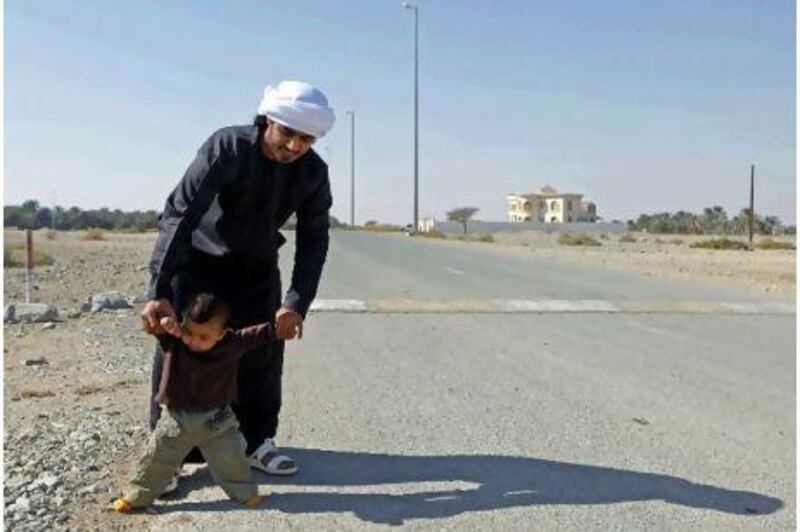RAS AL KHAIMAH // Village life has changed from the past. Today, the rhythm of life beats to modern economic demands. Increasingly, people are commuting to jobs in the cities.
But the quality of life in a smaller community is still an attraction.
Othaieba al Qaydi is one of about 50 women from Khadra and the neighbouring village of Shawka who catches the bus to UAE University in Al Ain each week.
The 18-year-old is one of thousands of university students, soldiers and police officers who makes the commute from the villages of the Northern Emirates to the cities of the south each week. This pattern of commuting makes village life possible.
"They are born here, they spend their lives here," said Othaieba.
"Their home and all of their friends are here."
Only one of Othaieba's 23 siblings lives away from the village. Her brothers work in the army or police, except one who is a student. Most women return to the village after they marry, often to teach. Her mother Fatima, who is about 55, moved to modern housing in Khadra around 1976. Originally from Sfini, she married at 14 to a 17- year-old boy.
Fatima had no formal education but has studied at a Quran school since 2006.
"I don't know how to read or write but I know how to break wood, make a fire, tend to goats and take care of the house," she said.
Fatima visits her palm farm each day, where she keeps two cows and 45 goats and sheep - six less after Eid, when they were slaughtered for relatives and the needy.
Her tie to the traditional farm has brought a modern freedom: a driving licence. With most men away in Abu Dhabi, what was rare 15 years ago is now common for rural women.
Her husband began work with the government soon after their marriage. He suffered a stroke 14 years ago that left him paralysed. A pension and government support provides them a stipend of Dh11,000 a month.
"We make do," said Fatima.
Her eldest daughter, who is 35, married at 19. This is no longer the norm because fewer women marry before obtaining a university degree. The marriage age is about 10 years higher than it was 30 years ago.
"The girls move wherever their husbands are," said Fatima. "Sharjah, Dubai, Dhaid, wherever their destiny is."
Fatima visits her mother every day. "We go for a drive. Every morning I take breakfast to them. And just like I love my parents, my children love me very much," she said.
It is this love that keeps her here.
"In the city there's not that much to do, you're just in your car," said Fatima. "Here you can go out and spend the night outside. It's all just roads and buildings in the city. "
In Al Hena, a neighbouring village with approximately 1,000 residents, Umm Matar al Qaydi, 30, has returned to high school.
The divorced mother of two is continuing her education with the support of her eight siblings.
"Today, more women want to do something with their future, to be a doctor or nurse for example and stay close to home," said Umm Matar.
"Things are changing. There are more opportunities. Ras al Khaimah is opening up a new branch of the municipality so this will also create jobs."
She hopes to gain a graduate degree after which she plans to pursue a career at the municipality.
One factor that caused the delay in her education was that until around 20 years ago, there was limited transport.
Another priority is supporting the household, 80 per cent of which have men working outside the village. Her younger brother, Saeed, 22, has worked in the army for five years, an hour and a half commute to Abu Dhabi.
With the road system improving, it also becomes easier to travel in and out of the village, easing the commute.
Both his parents grew up in Al Hena. His father used to work at a nearby school. Now he is on a pension but tends to his farms.
"Most men here work on the farms or traditional businesses," said Umm Matar. "It's far away from the other towns but at the same time it's kind of peaceful. So spiritually you're at ease."
To which her brother added: "In the cities, you'll never find coffee like this. And, here, the women can take long walks because it's very safe."
azacharias@thenational.ae






